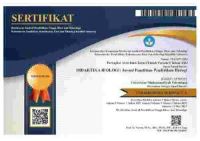PENGEMBANGAN MODUL BERBASIS INQUIRY LAB PADA MATERI SISTEM GERAK UNTUK MENINGKATKAN HASIL BELAJAR SISWA KELAS XI SMAN 1 MEJAYAN
Abstract
Tujuan penelitian adalah: 1) mengembangkan modul berbasis Inquiry Lab, 2) menguji kelayakan modul berbasis Inquiry Lab, dan 3) menguji efektivitas modul berbasis Inquiry Lab untuk meningkatkan hasil belajar siswa pada materi sistem gerak di SMA Negeri 1 Mejayan. Pengembangan modul berbasis Inquiry Lab mengacu pada 9 langkah model Research and Development (R&D) dari Borg & Gall (1983) meliputi: 1) penelitian dan pengumpulan data, 2) perencanaan, 3) pengembangan produk, 4) uji coba produk awal, 5) revisi produk I, 6) uji coba lapangan, 7) revisi produk II, 8) uji coba lapangan operasional, 9) revisi produk akhir. Hasil penelitian menunjukkan: 1) modul biologi Inquiry Lab pada materi sistem gerak yang dikembangkan menggunakan sintak Inquiry Lab (observasi, manipulasi, generalisasi, verifikasi, dan aplikasi); 2) kelayakan modul berbasis Inquiry Lab sebagai berikut: a) uji validasi ahli materi 93,00%, b) validasi ahli pengembangan desain 82,90%, c) validasi ahli perangkat 95,70%, d) validator praktisi (guru) 94,00%, dan e) uji kelompok kecil 83,82%; dan 3) modul berbasis Inquiry Lab pada materi sistem gerak efektif dalam meningkatkan hasil belajar siswa (Sig.=0,000 < a=0,05).
This research aimed: 1) to develop an inquiry-based laboratory module, 2) to test the feasibility of an inquiry-based laboratory module, and 3) to test the effectiveness of an inquiry-based laboratory module to improve students’ outcomes on motion system material at class XI of State Senior High School (SMAN) 1 of Mejayan. The development of an inquiry-based laboratory module referred to nine steps of Research and Development (R&D) model from Borg & Gall (1983) that included: 1) research and data collection, 2) planning, 3) product development, 4) initial product test, 5) product revision I, 6) field test, 7) product revision II, 8) operational field test, 9) final product revision. The research results showed: 1) the developed inquiry-based laboratory module on motion system material used the Inquiry Lab syntax (observation, manipulation, generalization, verification, and application), 2) the feasibility of an inquiry-based laboratory module as followed: a) the validation test of material expert at 93.00%, b) the validation of design development expert at 82.90%, c) the validation of tool expert at 95.70%, d) the validation of practitioners (teachers) at 94.00%, and e) the test of small group at 83.82%; and 3) an inquiry-based laboratory module on motion system material was effective to improve students’ outcomes (Sig.=0.000 < a=0.05).
Keywords
Full Text:
PDFReferences
Ali, M. (2007). Guru dalam Proses Belajar Mengajar. Bandung: Percetakan Sinar Baru.
Anderson, L.W. & Krathwohl, D.R. (2010). Kerangka Landasan Untuk Pembelajaran, Pengajaran dan Asesmen. (Terjemahan A. Prihantoro dari A Taxonomy for Learning, Teaching and Assesing: A Revision of Bloom’s Taxonomy of Educational Objectives A Bridged Eddition: Addison Wesley Longman, Inc. 2001). Yogyakarta: Pustaka Pelajar.
Arikunto, S. (2013). Prosedur Penelitian Suatu Pendekatan Praktik. Jakarta: Rineka Cipta.
Berkmen, M.B., Murthy, C.A. & Broulidakis, M.P. (2014). An Inquiry-Based Laboratory Module to Promote Understanding of the Scientific Method and Bacterial Conjugation. Journal of Microbiology & Biology Education, 15 (2), 321-322.
Borg, W.R. & Gall, M.D. (1983). Education Research: An Introduction (4th Edition). New York: Longman Inc.
BSNP. (2013). Laporan Hasil Ujian Nasional. Jakarta: Puslitbang Kemdikbud.
Depdiknas. (2008). Standar Penilaian Buku Pelajaran Sains. Jakarta: Pusat Perbukuan.
Emzir. (2012). Metodologi Penelitian Pendidikan: Kualitatif dan Kuantitatif. Jakarta: Raja Grafindo Persada.
Fithriyah, N.F. Feranie, S., Sari, I.M. & Komarudin. (2014). Implementasi Model Inquiry Lab untuk Meningkatkan Kompetensidan Kegiatan OSEAN Siswa dalam Rangka Pemenuhan Tuntutan Kurikulum 2013. Prosiding Seminar Nasional Fisika (E-Journal) SNF 2014, 07 Juni 2014. Jakarta: FMIPA Universitas Negeri Jakarta.
Galbreath, J. (1999). Preparing The 21st Century Worker: The Link Between Computer Based Technology and Future Skill Sets. Educational Technology, 39 (6): 4-22.
Johnson, L.F., Smith, R.S., Smythe, J.T, & Varon, R.K. (2009). Challenge-Based Learning: An Approach for Our Time. Austin, Texas: The New Media Consortium.
Mehrens, W.A. (1984). National Tests and Local Curriculum: Match or Mismatch. Educational Measurement: Nos and Practice, 3 (3), 9-15.
Millah, E.S., Budipramana, L.S. & Isnawati. (2012). Pengembangan Buku Ajar Materi Bioteklogi di Kelas XII SMA IPIEMS Surabaya Berorientasi Sains Teknologi Lingkungan dan Masyarakat (SETS). BioEdu, 1 (1), 19-24.
Nuangchalerm, P. & Thammasena, B. (2009). Cognitive Development, Analytical Thinking and Learning Satisfaction of Second Grade Students Learned through Inquiry-Based Learning. Asian Social Science, 5 (10), 82-87.
Prastowo. (2012). Panduan Kreatif Membuat Bahan Ajar Inovatif. Yogyakarta: Diva Press.
Rahdiyanta, D. (2012). Teknik Penyusunan Modul. Diakses dari http://staff.uny.id/sites/default/files/penelitian/dr-drw-rahdiyanta-mpd/20-teknik-penyusunan-modul.pdf
Rooney, C. (2009). How Am I Using Inquiry-Based learning to Improve My Practice and Toencourage Higher Order Thinking among My Students of Mathematics? Educational Journal of Living Theories, 5 (2): 99-127.
Rusche, S.N. & Jason K. (2011). “You Have to Absorb Yourself in It”: Using Inquiry and Reflection to Promote Student Learning and Self-knowledge. Teaching Sociology, 39 (4), 338 –353.
Santyasa, I.W. (2009). Metologi Penelitian Pengembangan dan Teori Pengembangan Modul. Makalah disajikan dalam penelitian bagi SD, SMP, SMA, dan SMK di Kecamatan Nusa Penida Kabupaten Klungkung, 12-14 Januari 2009.
Snyder, L.G. & Snyder, M.J. (2008). Teaching Critical Thinking and Problem Solving Skills. The Delta Epselon Journal, 50 (2): 90-99.
Sugiyono. (2013). Metode Penelitian Pendidikan. Bandung: Alfabeta.
Suratsih. (2010). Pengembangan Modul Pembelajaran Berbasis Potensi Lokal dalam Rangka Implementasi KTSP SMA di Yogyakarta. Laporan Hasil Penelitian Unggulan UNY.
Sungkono. (2003). Pengembangan Bahan Ajar. Yogyakarta: FIP UNY.
Suwastono. (2011). Pengembangan Pembelajaran E-Learning Berbasis Moodle pada Mata Kuliah Penginderaan Jauh S-1 Jurusan Geografi Universitas Negeri Malang. Tesis, tidak diterbitkan. Program Pascasarjana Universitas Negeri Malang.
Vajoczki, S., Watt, S., Vine, M.M., & Liao, R. (2011). Inquiry Learning: Level, Discipline, Class Size, What Matters? International Journal for the Scholarship of Teacing and Learning, 5 (1), artikel 10.
Waters, N.C. (2012). The Advantages of Inquiry-Based Laboratory Exercises within the Life Sciences. The Submitted Paper in Partial Fulfillment of The Master Teacher Program. Center for Teaching Excellence, Unitade States Military Academy, West Point, New York.
Wenning, C.J. (2010). Levels of Inquiry: Using Inquiry Spectrum Learning Sequences to Teach Science. Journal of Physics Teacher Education Online, 5 (4), 11-20.
Widowati, A. (2010). Pembelajaran Sains HOT dengan Menerapkan Inquiry Laboratory. Makalah disajikan dalam Seminar Nasional FMIPA Universitas Negeri Yogyakarta, 20 Mei 2010.
DOI: https://doi.org/10.32502/dikbio.v1i1.960
Copyright (c) 2018 Didaktika Biologi: Jurnal Penelitian Pendidikan Biologi
Didaktika Biologi: Jurnal Penelitian Pendidikan Biologi is indexed by:

Didaktika Biologi: Jurnal Penelitian Pendidikan Biologi is licensed under a Creative Commons Attribution-ShareAlike 4.0 International License.







